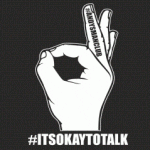Here, we talk about men’s mental health. And we look at some of the reasons why men might find it hard to get help. We also look at things that can help men’s mental health.
In this article, we:
- talk about the issues that many men may face
- talk about why it is important to look after your mental health
- offer ways to feel more relaxed and more confident in asking for support
Men can sometimes be told not to be vulnerable, get support or show emotions. This can make it harder for men to feel comfortable about getting support for themselves.
Why is it sometimes hard for boys and men to talk about mental health?
In society, there are many stereotypes. A stereotype is when there is a simplified idea of how a person should be. For example, men are often told to:
- be protectors
- rely on themselves (and not rely on anyone else)
- be rational and not show certain feelings like sadness
This can make it harder for men to tell people when they are having a hard time, especially with
their mental health. But seeking support is not a sign of weakness. It takes strength to tell
someone that you are struggling.
The importance of looking after your mental health
Mental health is as important as physical health. Mental health affects how we:
- make decisions
- build and keep relationships
- see ourselves in the world
When we do not take care of our mental health, it can affect our work, friendships and how we
feel about ourselves.
Instead of dealing with negative feelings and stress, sometimes we bottle up our emotions. But bottling things up can lead to our emotions building up. And we might try to cope in unhealthy ways. For example, some people might use alcohol or tobacco more. Or they might gamble or spend lots of time online.
Looking after yourself and getting support
Sometimes, opening up can feel like one of the hardest things to do. But seeking support means you are taking charge of your wellbeing. It shows you need things to change and that you want things to change. Here are a few examples of things that can support mental health.

Write down your thoughts
Writing or drawing your thoughts can help us to feel more focused. It can help us to understand more about the way we feel. And it can help us to see patterns or habits that we have. Writing or drawing our thoughts can be helpful, even if it is just for five minutes each day.

Keep doing things you enjoy
It is important to keep doing things we enjoy, like hobbies. This can help us to relax and give us a sense of purpose. We could also join a local group and meet people with shared interests.

Get a good night’s sleep
Adults need about eight hours’ sleep a night. But lots of us do not get enough sleep or good quality sleep. To get a good night’s sleep, remember to get outdoors during daylight and avoid caffeine in the afternoon and evening. And try to go to bed and wake up at the same times every day.

Reach out
Many men feel lonely. But, we can check in with other people and ask how they are. Andy’s Man Club offers free peer-to-peer support groups for men across the United Kingdom. Groups are both face-to-face and online. They aim to end stigma about men’s mental health through confidential, judgement-free spaces where men can open up.
Find out more at www.andysmanclub.co.uk
More information
This article was written with First Psychology. They are one of our Delivery Partners. First Psychology have created a booklet about men’s mental health. You can view and download a copy below.



